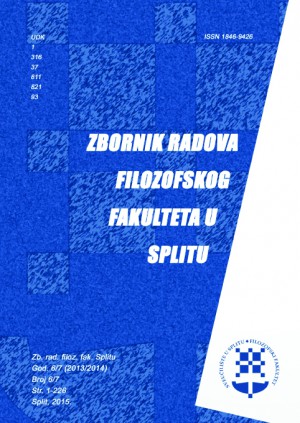UPISIVANJE ŽENSKOSTI U POPULARNU/ FANTASTIČNU/POLITIČKU TEKSTURU GLEDIŠTA – O PROZI DUBRAVKE UGREŠIĆ
THE INSCRIPTION OF FEMININITY IN THE POPULAR/FANTASTIC/POLITICAL TEXTURE OF OBSERVATION – ON THE PROSE OF DUBRAVKA UGREŠIĆ
Author(s): Josipa Korljan, Boris ŠkvorcSubject(s): Croatian Literature, Theory of Literature
Published by: Filozofski fakultet, Sveučilište u Splitu
Keywords: Deconstruction; identity; intertextuality; postmodernism; femininity;
Summary/Abstract: In this paper we research the layers of the inscription of femininity in the popular, fantastic and political prose of Dubravka Ugrešić. The relationship of the essentialist and/or constructivist positions of observing the subject/text/body is decoded, reinterpreted and commented upon. Gender positioning and the shaping of a slippery identity is followed and interpreted by referring to Moya and Foucault. Emphasis is laid on the layers of utterances that refer to identity which have not been decoded in previous interpretations. A femininity inscribed in the novel Štefica Cvek u raljama života (Štefica Cvek in the Jaws of Life) is detected; the author flirts with the popular (trivial) paradigm of femininity by presenting the stereotypes of femininity formed by ‘the male perspective’ of the national corpus of narratives. Simultaneously, the author lets us ‘reiron the text’, which leads us to the intertextuality of the fantastic prose Život je bajka (Life is a Fairytale). Ministarstvo boli (Ministry of Pain) forms the ground for questioning identity in the texture of the exile/emigrant. The model of identity is no longer deconstructed by the text; the main perpetrator of deconstruction becomes what was afore-denied – reality. Dealing with positioning of identity in the other milieu gives Croatian ‘women’s prose’ a dimension it has not had until now. We can also see this in the novel Baba jaga je snijela jaje (Baba Yaga Has Laid an Egg), by which the author encircles the story of inscribing femininity within the popular and textual culture of the space she had left behind. While redefining some elements of textual intention in Ugrešić’s prose, we also redefine the place of this corpus in both Croatian literature and women’s writing in Croatia.
Journal: Zbornik radova Filozofskog fakulteta u Splitu
- Issue Year: 2009
- Issue No: 2-3
- Page Range: 65-84
- Page Count: 20
- Language: Croatian

